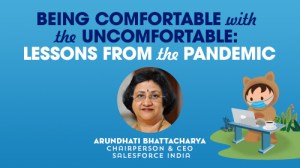This article was originally published in COMMUNITY by NASSCOM Insights.
COVID-19 has upended our world in more ways than one. It has pushed us out of our comfort zones and forced us to rethink the way we work, engage with customers, use technology, and deliver impact. But it has also given us the opportunity to reset and reinvent.
Earlier this year, I was in the midst of my own “resetting and reinventing”. After over 40 years in the banking sector, I had decided to switch tracks completely and join Salesforce. It was a huge change. From an Indian public sector company to an American multinational firm. From an established bank with a long legacy, to a relatively young company with just a few years of experience in India. From my previous position as Chairperson to my new role as CEO, which until the time hadn’t existed in Salesforce’s India operations. All this in the midst of an unprecedented global pandemic.
I was certainly stepping outside my comfort zone. But it was also a chance to be part of something great. So far, I’ve had an incredible ride. And along the way, I’ve learned a few things:
Digital will be the future
One of the reasons I joined Salesforce was to have a ringside view to the digital revolution that’s taking the world by storm. Today, no industry can do without technology—be it healthcare, education, manufacturing, or even handicrafts. Digital technology is the backbone of business—if you don’t have it, you can’t stand straight.
But why is it so important? Because like the advent of roadways and electricity, technology is connecting people in profound new ways. Who could have imagined that I’d be talking face-to-face with my Sydney-based colleagues in the morning, my San Francisco-based peers in the evening, and a whole host of others in between—all from the comfort of my bedroom? Technology is making that possible.
Even when the pandemic has forced people apart physically, digital technology is bringing us closer together. CEOs must now act as chief digital officers, leading the digitalisation of their businesses and, in doing so, catalysing a global recovery.
Work-from-home will transform into work-from-anywhere
At SBI a few years ago, I tried introducing a work-from-home option that would make it easier for women to balance the demands of work with the responsibilities of caring for children or elderly parents at home. Surprisingly, the project met with a lot of resistance from people—including women—who felt that working from home would hamper productivity.
But the pandemic has proven otherwise. Today, teams working from home aren’t just meeting their original productivity targets—they’re often exceeding those numbers. They don’t need a manager looking over their shoulder to ensure that a job gets done. Those days are gone.
In the future, work-from-anywhere will become a reality. That in turn will give rise to education-from-anywhere, health-from-anywhere, sales-from-anywhere, and more. Companies that intelligently transition to these new models of work are likely to witness up to 20% more productivity and 20% lower costs.
A new era of “phygital” will emerge
While the pandemic may have accelerated the shift to digital, it has also taught us to value the physical. Online shopping can’t always replace the experience of visiting a physical store. Working from home can’t always replicate the sense of collaboration and teamwork that comes from working in an office.
In short, our lives aren’t going to be completely digital anytime soon. Instead, we’re likely to see hybrid or “phygital” models that combine the best of digital and physical in a seamless manner. People will be able to effortlessly move between the two as they shop, bank, access healthcare, work, consume entertainment, and more.
Resilience and preparedness will matter
Over the years, I’ve learned that you can’t always prevent a crisis—but you can be prepared to mitigate its impact. In my previous organisation, we had a massive document detailing all the possible risk scenarios that the businesses needed to avoid. But inevitably, a crisis would occur that we hadn’t envisioned. For instance, none of us saw demonetisation coming. Fewer still could have predicted a pandemic.
There will always be unforeseen challenges thrown at businesses. And the only way to survive is to be resilient—to have processes and systems that help you respond rapidly and adapt to crises. It calls for strong leadership at all levels of the organisation. Technology can also be invaluable in providing early warning signals that help businesses anticipate and be better prepared for the risks ahead.
Trust will be more important than ever
As businesses, we have a responsibility to give back to society, especially during this pandemic. At Salesforce, we’ve sourced 50 million units of PPE, such as masks, gowns, suits, and face shields for hospitals in India, the US, and France. We also developed specific solutions such as Work.com to help businesses reopen safely.
Meanwhile, through our 1-1-1 model, we dedicate 1% of our time, 1% of our products, and 1% of our profits to build a better world. We also have an Office of Ethical and Humane Use of Technology to ensure that our technology is used to help and not harm society.
Underpinning all these initiatives is a commitment to uphold the trust of our stakeholders, and demonstrate that business can truly be a platform for change.
The pandemic will eventually go away. But rather than returning to business as usual, we as companies have the chance to “build back better” – to transform the way we work; to reimagine our business models with technology; and to create a positive impact on society. The possibilities are endless.





















